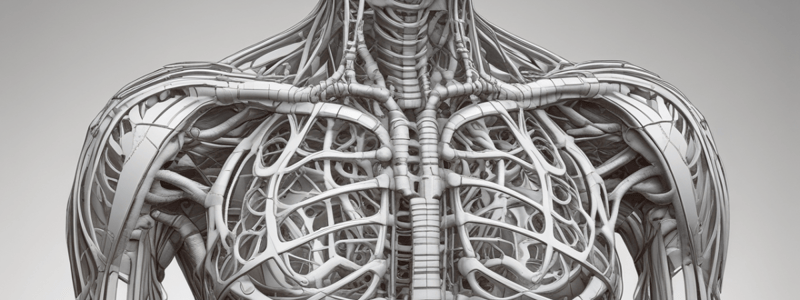Podcast
Questions and Answers
What is the term for the bony framework of the chest that consists of the thoracic vertebrae, ribs, and sternum?
What is the term for the bony framework of the chest that consists of the thoracic vertebrae, ribs, and sternum?
thoracic cage
What is the name of the congenital anomaly where the left and right ossification centers of the sternal body fail to fuse completely?
What is the name of the congenital anomaly where the left and right ossification centers of the sternal body fail to fuse completely?
sternal foramen
What are the three main components of the sternum?
What are the three main components of the sternum?
manubrium, body, and xiphoid process
What is the term for the superior indentation between the clavicular notches of the sternum?
What is the term for the superior indentation between the clavicular notches of the sternum?
What is the function of the thoracic cage?
What is the function of the thoracic cage?
What is the term for the process of the sternum where the left and right clavicles articulate?
What is the term for the process of the sternum where the left and right clavicles articulate?
What is the shape of the sternum likened to?
What is the shape of the sternum likened to?
What is the term for the lowest part of the sternum?
What is the term for the lowest part of the sternum?
What is the clinical significance of the sternal angle?
What is the clinical significance of the sternal angle?
What is the difference between true ribs and false ribs?
What is the difference between true ribs and false ribs?
What is the function of the costal groove on a rib?
What is the function of the costal groove on a rib?
What is the name of the small, inferiorly pointed cartilaginous projection at the tip of the sternum?
What is the name of the small, inferiorly pointed cartilaginous projection at the tip of the sternum?
What are the two parts of the sternum that articulate at the sternal angle?
What are the two parts of the sternum that articulate at the sternal angle?
What is the name of the bony structure that represents the blade of a sword?
What is the name of the bony structure that represents the blade of a sword?
What is the feature that distinguishes a bifid rib?
What is the feature that distinguishes a bifid rib?
What is the name of the cartilaginous extensions that articulate with the sternum?
What is the name of the cartilaginous extensions that articulate with the sternum?
What are the three parts of a rib that articulate with a vertebra?
What are the three parts of a rib that articulate with a vertebra?
What is the name of the anomaly where the costal element of the seventh cervical vertebra elongates?
What is the name of the anomaly where the costal element of the seventh cervical vertebra elongates?
Flashcards are hidden until you start studying
Study Notes
Thoracic Cage
- The thoracic cage is a bony framework that consists of the thoracic vertebrae, ribs, and sternum.
- It acts as a protective enclosure around the thoracic organs and provides attachment points for many muscles.
Sternum
- The sternum is a flat bone that forms in the anterior midline of the thoracic wall.
- It has three parts: the manubrium, the body, and the xiphoid process.
- The manubrium is the widest and most superior portion of the sternum, representing the handle of the bony sword.
- The body is the longest part of the sternum, representing the blade of the bony sword.
- The xiphoid process represents the very tip of the sword blade.
Sternal Foramen
- A midline sternal foramen is present in the body of the sternum in up to 4-10% of adults.
- It represents failure of the left and right ossification centers of the sternal body to fuse completely.
Ribs
- Ribs are elongated, curved, flattened bones that extend from the thoracic vertebrae to the anterior thoracic wall.
- Both males and females have 12 pairs of ribs.
- Ribs 1-7 are called true ribs, which articulate directly to the sternum by separate costal cartilages.
- Ribs 8-12 are called false ribs, which do not articulate directly to the sternum.
- Ribs 11 and 12 are called floating ribs because they have no articulation with the sternum.
- The vertebral bodies articulate with the head of a rib.
- The articular surface of the head is divided into superior and inferior articular facets by an interarticular crest.
- The surfaces of these facets articulate with the costal facets or demifacets on the bodies of the thoracic vertebrae.
Rib Development Anomalies
- Cervical ribs may compress the artery and nerves extending toward the upper limb, producing tingling or pain.
- An extra pair of ribs may form from the costal elements of the first lumbar vertebra.
- Some individuals lack a pair of twelfth ribs because their costal elements from the twelfth thoracic vertebra failed to elongate.
- Fused (bicipital) ribs occur in some individuals.
- Bifid ribs occur in 1.2% of the world's population, where a rib splits into two separate anterior portions when it reaches the sternum.
Studying That Suits You
Use AI to generate personalized quizzes and flashcards to suit your learning preferences.




